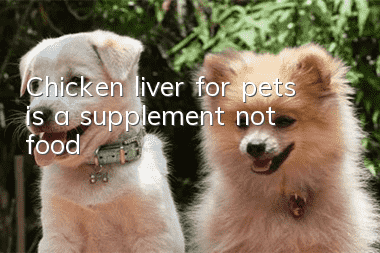Chicken liver for pets is a supplement, not food

Should pets eat chicken liver? What are the advantages and disadvantages of chicken liver? In fact, there are various disadvantages to eating liver for a long time, but this does not mean that chicken liver must not be eaten. In some cases, chicken liver can be a good supplement for dogs and cats.
cat
Some pet owners say, "My little animals have been eating chicken livers for several years and I don't think there is anything wrong with it!" Should they eat chicken livers? What are the advantages and disadvantages of chicken livers?
Chicken liver mainly contains protein, fat, carbohydrates, vitamin A, vitamin D, phosphorus and other ingredients. It has high nutritional value, good palatability, and a unique fishy smell, which is loved by dogs and cats. However, if you eat liver for a long time, and only eat liver, some diseases will occur.
Obesity - Since chicken liver is rich in fat and carbohydrates, dogs and cats that eat liver for a long time will have excess energy and become obese. Being too obese will increase the incidence of diabetes, pancreatitis, and cardiovascular disease.
Itchy skin - There are many growth promoters in chicken feed. Most of these chemicals are metabolized by the liver. Therefore, eating chicken liver for a long time can cause food allergies or chronic accumulation poisoning, which can easily lead to skin diseases.
Vitamin A poisoning - Chicken liver contains a large amount of vitamin A. Feeding chicken liver mixed with carrots will cause excessive vitamin A in dogs. If it cannot be excreted in time, it will cause accumulated vitamin A poisoning, causing pain, lameness, tooth loss and other diseases. .
Calcium deficiency - Since liver contains high phosphorus and low calcium, and phosphorus inhibits the absorption of calcium, long-term consumption of liver will lead to calcium deficiency in the body, resulting in rickets in young dogs and cats or rickets in adult dogs and cats.
Bleeding - The body's blood coagulation requires the participation of calcium. If dogs and cats eat liver for a long time and cause calcium deficiency, it will cause coagulation dysfunction. Chronic bleeding or acute bleeding will not be easy to stop.
Postpartum convulsions - Dogs and cats that have been eating liver for a long time will lose a lot of calcium due to breastfeeding after giving birth, and their own calcium reserves are very small, so they are prone to hypocalcemia, which manifests as panting, salivation, convulsions, and stiff limbs. Death may occur if not treated promptly.
Although there are various disadvantages to eating liver for a long time, it does not mean that chicken liver must not be eaten. In some cases, chicken liver can be a good supplement for dogs and cats:
First of all, dogs and cats prone to colds and diarrhea can take advantage of the high vitamin A content of chicken liver to maintain the integrity of respiratory and digestive tract epithelial cells to enhance the body's resistance.
Second, for dogs and cats with poor appetite or serious illness and no appetite, the good palatability of chicken liver can be used to stimulate appetite and gradually restore digestive tract function.
Third, for dogs and cats with poor nutrition or thin constitution, the high protein content in chicken liver can allow them to increase nutrition and enhance their physical fitness.
- What are the symptoms of dog enteritis?
- How to tell if a Corgi is pure or not?
- Learn these points and your dog’s health status will be clear at a glance
- How to deworm dogs? Dog deworming method steps
- How to make dogs digest chicken bone food
- Couple keeps pets and enjoys high-end treatment, netizens expressed envy after watching it
- How to prevent canine distemper infection
- Do puppies get cataracts because of improper feeding?
- How to protect your dog’s meat pads?
- Do Corgis have body odor? How to get rid of body odor?



